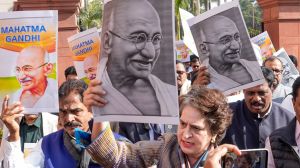From the Urdu Press: ‘BJP could not get its act together to give Manmohan Singh a funeral’
“Congress should reflect on the state of INDIA bloc’s unity, while AAP should review its political objectives in the context of national politics,” says Roznama Rashtriya Sahara
 The dailies highlighted how the soft-spoken, erudite Singh wielded power, with decency and sagacity, empathy and humility, and underlined his command of the Urdu language. (Photo: X/@BJP4India)
The dailies highlighted how the soft-spoken, erudite Singh wielded power, with decency and sagacity, empathy and humility, and underlined his command of the Urdu language. (Photo: X/@BJP4India)The passing away of former prime minister Manmohan Singh dominated the coverage of the Urdu dailies, as they spotlighted the arc of a towering leader who rose from a Partition refugee to the pinnacle of power, while steering the country’s transformation into a global economic powerhouse and a modern welfare State. The dailies highlighted how the soft-spoken, erudite Singh wielded power, with decency and sagacity, empathy and humility, and underlined his command of the Urdu language. They also captured the slugfest between the Congress and BJP over a resting place for the departed statesman. The Congress has questioned the delay in deciding a memorial place for Singh, while the BJP has said that the process has been set in motion and a resting place in Delhi would be identified soon.
SIASAT
Flagging the war of words between the Congress and the BJP over a site for the cremation and memorial of Manmohan Singh, the Hyderabad-based Siasat, in its editorial on December 30, points out that while the Congress has accused the Narendra Modi government of “insulting India’s first Sikh PM” Singh because of the cremation being held at Delhi’s Nigambodh Ghat, the BJP has raked up several past instances, including the anti-Sikh riots of 1984, that show the grand old party in a poor light.
The political play has been underway since Singh’s demise, the daily writes. “Manmohan Singh’s passing away evoked an outpouring of grief and condolences from the nation. The BJP seemed to have failed to anticipate the scale of resonance that Singh’s departure would create among the people across the country, drawing glowing tributes even from his staunch critics,” it says. “This explains why the BJP could not get its act together in dealing with the demands for a resting place for Singh befitting his stature and his stellar services for the country.”
Noting that the BJP raised 1984 riots to counter the Congress, “which had tendered apologies over it”, and despite law “catching up with some of the riot accused”, the daily says: “Singh deserved more justice in his life and times. He pulled the economy from the brink and set the stage for it to emerge as the world’s fifth largest economy. During his prime ministership, he remained in the line of fire from multiple quarters. He was subjected to various allegations and even personal attacks. At least, justice should be done to him after his death. The government should avoid negative politics and review its stance over the memorial row.”
ROZNAMA RASHTRIYA SAHARA
With the conflict between the two key constituents of the INDIA bloc in Delhi, the Aam Aadmi Party (AAP) and Congress, escalating ahead of the Assembly polls due in February, the New Delhi edition of the Roznama Rashtriya Sahara, in its December 27 leader, says that when a slew of parties from several states, regardless of their different views, interests and objectives, came together on a single platform last year to collectively take on the formidable BJP, it seemed like a game changer in the country’s politics. It is another matter that the INDIA bloc has not proved to be really successful in its fight against the BJP so far, the editorial says, adding that the resurgence of a face-off between the AAP and the Congress has now posed a fresh challenge to the unity and salience of the Opposition alliance.
The daily points out that the conflict has now flared up with senior AICC leader Ajay Maken calling AAP chief Arvind Kejriwal “a king of fraud” and dismissing the AAP government’s various welfare schemes in Delhi as being “just on paper”. “While the AAP showcases its welfare work in the education, health, water and electricity sectors as revolutionary, the Congress has sought to trash them as merely an eyewash and political hype,” it says. “The AAP has rejected these Congress allegations, accusing the grand old party of colluding with the BJP against it… They even gave an ultimatum to the Congress leadership to take action against Maken within 24 hours, failing which they said the AAP would approach other INDIA partners to seek the Congress’s ouster from the bloc.”
The editorial suggests that the fresh INDIA crisis makes it imperative for both the AAP and the Congress to do some introspection. “The Congress should reflect on the state of the INDIA bloc’s unity, while the AAP should review its political objectives in the context of national politics,” it says. “The INDIA alliance was forged in order to propose a national political alternative to the people. It came into existence in larger public interest where each of its constituents was required to rise above its narrow political calculations. Its strength and credibility lie in this common purpose and integrity, which is now being undermined due to a crisis like the Delhi one,” the edit states. If the power play between the AAP and the Congress intensifies, it may deal a body blow to the INDIA bloc, it says. “A broadbased Opposition coalition which had virtually seemed a miracle, is now running the risk of unravelling within a year.”
- 01
- 02
- 03
- 04
- 05






























